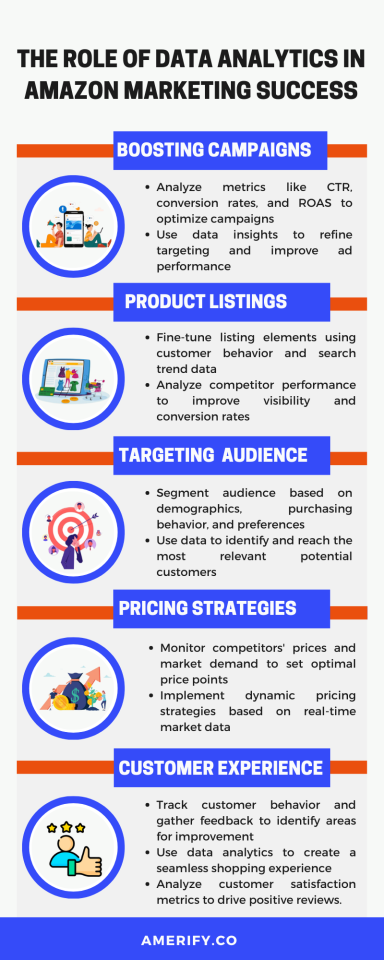Key Takeaways:
- Empowering Informed Decisions: Data analytics is the backbone of a successful Amazon strategy, providing actionable insights to optimize product listings, enhance advertising campaigns, and drive higher ROI.
- Targeting Precision: By leveraging data analytics, businesses can identify and segment their most profitable audiences, enabling precise targeting and personalization that boosts customer engagement and sales.
- Adaptability and Competitiveness: Advanced analytics tools empower sellers to adapt quickly to market trends, optimize pricing strategies, and streamline inventory management, ensuring a competitive edge in Amazon’s dynamic marketplace.
Amazon data analytics is the process of collecting, analyzing, and interpreting data from various aspects of Amazon’s marketplace.
This data-driven approach enables sellers to make informed decisions, optimize their product listings, enhance marketing strategies, and increase sales.
Understanding the role of data analytics is crucial for those considering hiring an Amazon marketing agency.
It’s the backbone of successful Amazon marketing, helping businesses navigate the complexities of the platform and stay ahead of the competition.
For those considering hiring an Amazon marketing agency, expertise in data analytics is a key factor that can make or break your success on the platform.
These agencies use advanced analytics tools to unlock actionable insights, allowing your business to stay agile, adapt quickly to changes, and maintain a competitive edge.
Role of Data Analytics in a Successful Amazon Marketing Strategy

1- Boosting Advertising Campaigns
Effective advertising on Amazon requires more than setting up campaigns; it demands continuous optimization to ensure that your ads reach the right audience at the right time.
Data analytics provides insights into ad performance, enabling you to adjust your strategies for better results.
By analyzing metrics such as click-through rates (CTR), conversion rates, and return on ad spend (ROAS), you can refine your campaigns to achieve maximum ROI.
Example:
Let’s say you’re running sponsored product ads for a new line of kitchen gadgets. Through data analytics, you discover that ads featuring specific keywords like “space-saving” and “multi-functional” perform better than others.
You can then focus your budget on these high-performing keywords, optimizing your ad spend and increasing the chances of conversions.
2- Optimizing Product Listings
Product listings are the face of your business on Amazon. Every element, from the title and description to images and keywords, plays a critical role in attracting potential buyers.
Data analytics allows you to optimize these elements by understanding what resonates most with your target audience.
By analyzing customer behavior, search trends, and competitor performance, you can fine-tune your listings to improve visibility and conversion rates.
Example:
Imagine you’re selling organic skincare products. By leveraging data analytics, you discover that customers frequently search for “paraben-free” and “cruelty-free” options.
You can then incorporate these keywords into your product title and description, making your listing more relevant and likely to appear in search results.
Additionally, analyzing customer reviews may reveal that buyers appreciate detailed ingredient lists, prompting you to include this information in your listing to boost trust and sales.
3- Targeting the Right Audience
Targeting the right audience is essential for maximizing ROI. Without precise targeting, your marketing efforts may reach individuals who are unlikely to convert, leading to wasted ad spend.
Data analytics enables you to identify and segment your audience based on demographics, purchasing behavior, and preferences, ensuring that your ads reach the most relevant customers.
Example:
Suppose you’re selling fitness equipment. Through data analytics, you can identify that your most profitable customers are millennials interested in home workouts.
You can then tailor your advertising campaigns to target this demographic, using language and visuals that resonate with them.
This focused approach increases the likelihood of conversions, as your ads are more relevant to the audience’s needs and interests.
4- Enhancing Pricing Strategies
Pricing is one of the most critical factors influencing purchasing decisions on Amazon.
An effective pricing strategy can make your product more competitive, attract customers, and increase profitability. Data analytics helps you monitor competitors’ prices, understand market demand, and identify the optimal price points that maximize sales while maintaining healthy margins.
Consider a scenario where you’re selling electronics. Through data analytics, you notice that your competitors frequently adjust their prices based on demand fluctuations.
By implementing a dynamic pricing strategy that uses real-time data, you can automatically change your prices to stay competitive, attract more buyers, and increase sales without sacrificing profit margins.
5- Leveraging Big Data for Personalization
In today’s competitive e-commerce environment, personalization is critical to standing out and building customer loyalty.
Leveraging big data allows Amazon sellers to create tailored experiences for each customer based on their browsing behavior, purchase history, and preferences.
Sellers can increase customer engagement, boost sales, and foster long-term relationships by offering personalized recommendations and targeted promotions.
Imagine you run a bookstore on Amazon. Through data analytics, you can track what types of books each customer buys and how often they make purchases.
By analyzing this data, you can recommend new releases or similar titles that align with their interests.
For example, if a customer frequently purchases mystery novels, you can suggest the latest mystery bestsellers, increasing the likelihood of repeat purchases.
6- Prioritizing Security through Amazon Built-in Tools
As e-commerce grows, so does the importance of data security. For Amazon sellers, safeguarding account information and maintaining the integrity of their business operations is crucial.
Amazon’s robust security measures help sellers protect their accounts by identifying potential threats, preventing unauthorized access, and ensuring compliance with stringent policies. Sellers can further enhance their security by enabling two-factor authentication, monitoring account notifications, and regularly reviewing performance and order metrics for any irregularities.
For example, if an Amazon seller notices a sudden spike in returns or cancellations through their Seller Central reports, this could indicate potential fraud or an issue with product quality that needs immediate attention.
By leveraging Amazon’s security tools and maintaining vigilant account management practices, sellers can protect their reputations, avoid costly issues, and build trust with their customers.
Think of an Amazon seller who handles a large volume of transactions daily. Using data science, they can monitor transaction patterns or unusual activity, such as multiple failed login attempts or sudden spikes in order volume from a single account.
7- Improving Inventory Management
Effective inventory management is crucial for maintaining a healthy Amazon business.
Overstocking can lead to increased storage fees, while understocking can result in lost sales and a negative impact on your seller rating.
Data analytics helps you forecast demand, manage stock levels, and optimize your inventory to meet customer needs without incurring unnecessary costs.
Let’s take an example of you selling seasonal products like holiday decorations. Data analytics can help you predict demand spikes during the holiday season, allowing you to stock up on inventory in advance.
Conversely, it can also help you avoid overstocking after the season ends, minimizing excess inventory and reducing storage costs.
8- Enhancing Customer Experience
Customer experience is a key driver of success on Amazon. Positive experiences lead to higher customer satisfaction, repeat purchases, and positive reviews—all of which contribute to better rankings and increased sales.
Data analytics allows you to track customer behavior, gather feedback, and identify areas for improvement, helping you create a seamless and enjoyable shopping experience.
As an example of Enhancing Experience, suppose you notice through data analytics that customers frequently return a particular product due to size issues.
You can address this problem by providing more detailed sizing information in the product description or offering a sizing chart. This proactive approach can reduce returns, improve customer satisfaction, and enhance your overall seller rating.
Conclusion
In today’s data-driven world, leveraging data analytics is not just an advantage—it’s a necessity for Amazon sellers aiming for long-term success.
From optimizing product listings and targeting the right audience to refining pricing strategies, enhancing advertising campaigns, and managing inventory efficiently, data analytics plays a pivotal role in every aspect of your Amazon marketing strategy.
It empowers sellers to make informed decisions, anticipate market trends, and personalize the shopping experience, all of which contribute to higher sales and improved customer satisfaction.
Furthermore, in an increasingly complex digital marketplace, prioritizing data security through data science ensures that your business remains trustworthy and protected from potential threats. The ability to analyze large volumes of data and extract meaningful insights allows Amazon sellers to stay ahead of the competition, adapt quickly to changes, and ultimately drive sustainable growth.
For Amazon business owners, partnering with a marketing agency that specializes in data analytics can be a game-changer. These agencies have the expertise to turn raw data into actionable strategies that maximize your ROI and elevate your brand on the platform.
Do you want to transform your Amazon business with data-driven insights?
Unlock your Amazon business’s full potential—partner with experts at Amerify who can turn data into action. Let’s collaborate to unlock your full potential.
Contact us today to discover how our expert team can help you navigate the complexities of Amazon marketing, drive growth, and achieve your business goals. Don’t let your competitors get ahead—take the first step towards success now!



